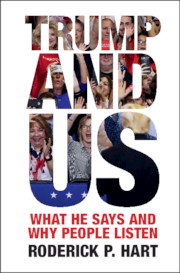Book contents
- Trump and Us
- Communication, Society and Politics
- Trump and Us
- Copyright page
- Dedication
- Contents
- Figures
- Tables
- Acknowledgments
- Part I Feeling Conflicted
- Part II Feeling Ignored
- Part III Feeling Trapped
- Part IV Feeling Besieged
- Part V Feeling Tired
- 8 Trump’s Novelty
- 9 Trump’s Spontaneity
- Part VI Feeling Resolute
- Index
- Communication, Society and Politics
9 - Trump’s Spontaneity
from Part V - Feeling Tired
Published online by Cambridge University Press: 24 February 2020
- Trump and Us
- Communication, Society and Politics
- Trump and Us
- Copyright page
- Dedication
- Contents
- Figures
- Tables
- Acknowledgments
- Part I Feeling Conflicted
- Part II Feeling Ignored
- Part III Feeling Trapped
- Part IV Feeling Besieged
- Part V Feeling Tired
- 8 Trump’s Novelty
- 9 Trump’s Spontaneity
- Part VI Feeling Resolute
- Index
- Communication, Society and Politics
Summary
Everyone has an opinion about Donald Trump’s tweets. Lisa Lampanelli, a professional comedian specializing in racy humor, finds his tweets remarkably disgusting. “I saw Trump be a roastmaster at the Friars Club,” Lampanelli reports, “but he doesn’t have the skill to do this kind of thing with the right intention underneath it. Is it entertaining to some? I don’t find these tweets entertaining in the least. It’s off-putting and it gets to a scary, bully level.”1 Folks working in the District of Columbia agree. “Stop it!” said Senator Lisa Murkowski of Alaska; “the Presidential platform should be used for more than bringing people down.” “This isn’t normal,” echoed her senatorial colleague, Ben Sasse of Nebraska, “it’s beneath the dignity of [the President’s] office.” Trump’s Twitter usage “represents what is wrong with American politics, not the greatness of America,” said South Carolina’s Senator Lindsey Graham.2
- Type
- Chapter
- Information
- Trump and UsWhat He Says and Why People Listen, pp. 196 - 226Publisher: Cambridge University PressPrint publication year: 2020

